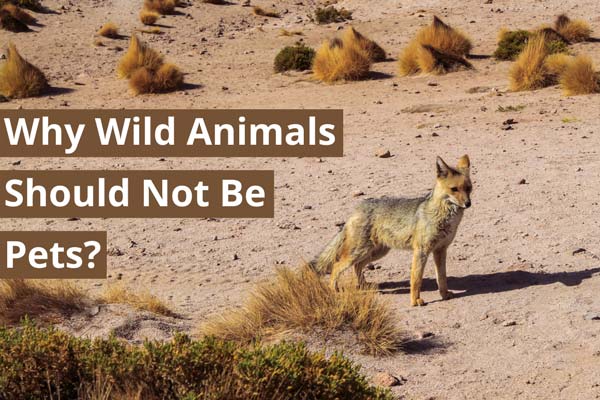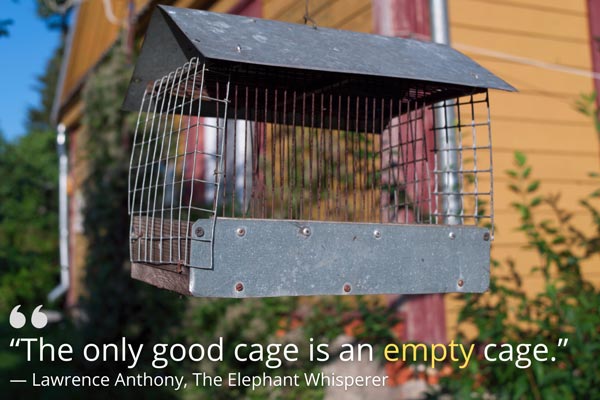Why Wild Animals Should Not Be Kept as Pets?
In recent years, there’s been a sudden interest in certain animals—usually those who are indigenous to the wilderness. This poses a huge concern for all of us since quite a lot of people have taken a liking to adopt these wild animals as pets. Exotic creatures like panthers and tigers might seem like the perfect pet for some people—but they’re far from perfect. If you’re someone who’s ever found the idea of owning a lion cute cub-keep reading to find out reasons why wild animals should not be pets.
Table of Contents
Why Wild Animals Should Not Be Pets?
Firstly, It’s Illegal
If you, or someone you know, own an exotic pet—you’re probably at risk of getting arrested. It’s an illegal activity to keep a wild animal in your house—even the tiniest of birds like robins belong to the outside world, and it is against the law to keep them in captivity.
Every year, hundreds of wild animals like bears, snakes, leopards are rescued from people who had been hiding them in their houses. These animals have undergone thousands of years of evolution in adaptation to the wild. Keeping them in a domestic environment is both unhealthy and dangerous. Therefore, wild animals should not be kept as pets.
They Might Not Need Your Help
People who adopt abandoned animals usually assume that the animal needed help, and they did it a favor by “rescuing” it. Most often, that’s not the case. It’s been observed that animals—such as rabbits—tend to leave their young ones alone to avoid unnecessary attention.
These animals have not been abandoned; instead, they are learning to survive for themselves. Picking them up and taking them home is the exact opposite of what the animal needed. If you genuinely think an animal needs rescuing or has an injury, inform your local wildlife center.
Wild Animals May Carry Diseases
Adorable as they may seem, animals like baby raccoons and chimpanzees often carry zoonotic diseases—without any symptoms. Some of them, such as rabies, can be deadly to humans. Furthermore, they can even pass on their illnesses to household pets such as cats and dogs, making them susceptible to diseases such as distemper.
Wild animals should not be pets because, unlike pets, they have never been vaccinated and have never been taken to the vet. Taking such creatures in our homes not only poses a threat to us but also to the animal itself.
They Can Attack You
A wild animal given shelter in a house alongside humans is torn between its wild instincts and its newfound dependence on humans. Most often, these animals become frustrated, and the slightest of disturbances will trigger them to attack you.
If you need more reasons why wild animals should not be pets, here’s one—Sandra Piovesan was a woman who had adopted nine wild wolves and grown very close to them. A report shows her stating that the wolves provided her with “unqualified love.” Apparently, the love only lasted till July 19, 2006, when the wolves decided it was time to devour the woman.
Their Species May Become Endangered
Every year, there is a trade of thousands of parrots across the world, resulting in them becoming the world’s most endangered animals. The demand for exotic animals is unbelievably great, and this is threatening many animals on the brink of extinction.
Animals like vipers, jaguars, and other reptiles and birds are illegally captured and sold in the black market every year. If this continues to happen, these animals will suffer from the same fate as the dodos did in the 16th century.
Some Animals Are More of a Concern Than Others
Our closest relatives, the apes, are intelligent animals. Baby apes are especially appealing, and this has resulted in them being used for movies, TV shows, and commercials across the globe.
But behind the curtains, these animals are frequently beaten, abused, and even starved to train for these programs. Apart from the extreme animal abuse which happens offset, these animals pose a much greater threat than other animals. Combined with their natural strength and intelligence, apes are spontaneous in causing injuries and harm when provoked.
They Get Larger in Size
A baby tiger is just around 0.8 kgs when born, but merely six months later, they get 40 times heavier. This massive increase in size is because of them being one of nature’s most dangerous predators.
Baby animals are indeed hard to resist, but as the animal grows older, unfortunately, you become the one hard to resist. It’s understandable; hunting is a wild animal’s natural instinct. Making them your pet was a wrong choice in the first place.
Long Lifespans
It’s disheartening when a pet dies, but this has led to many people simply assuming animals’ lifespans. You might expect a parrot to live for ten to fifteen years, but some species of birds live up to seventy years of age. This longevity often comes off as a surprise for owners of such animals who were unprepared to care for them for so long.
This leads to people abandoning these animals in the wild, where old age and an inability to fetch food for themselves eventually kill them. Hence, keeping wild animals as pets is a bad idea.
They Get Sick
Exotic pets might seem to enjoy the lavishness of human homes and the luxuries it provides, but they’re suffering. Animals like primates are sociable, and being away from others of their species, they grow sad and lonely—just like us. These animals have much more complex needs than domestic pets.
For example, some animals need trees to feel secure, and humans don’t usually live-in trees, hence the inconvenience. Some animals, such as reptiles, undergo hibernation during winter. But captivity confuses them, and they go through immense stress and behavioral changes.
They Try to Escape
How would you feel if your pet dog escaped from your house every second day? Sounds quite the trouble, right? The same happens to owners of exotic pets. As mentioned earlier, these animals are usually given to living in unsuitable environments, and at some point, they reach a trigger point. At this stage, the animal might try to attack the humans—or try to flee.
There are thousands of reports of exotic pets disappearing from their homes annually. These animals often resort to streets where they strangle, maul, and even kill passersby. This usually follows authorities being brought to the spot where the wild animal, scared and helpless, is killed on sight.
Conclusion:
Bringing a wild animal into your home may seem like an act of gratitude, but in reality, it is a living hell for the animal. Millions of cats and dogs go through euthanasia each year just because nobody wants to adopt them. Why bring a creature, which is perfectly happy in its home, to a foreign world where it is lonely and frightening? Why not turn to give a new life to animals that want it?
Therefore, let’s try and protect the animals in our natural surroundings instead of the wild ones. We should also make sure that natural habitats are protected for these wild animals.

